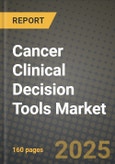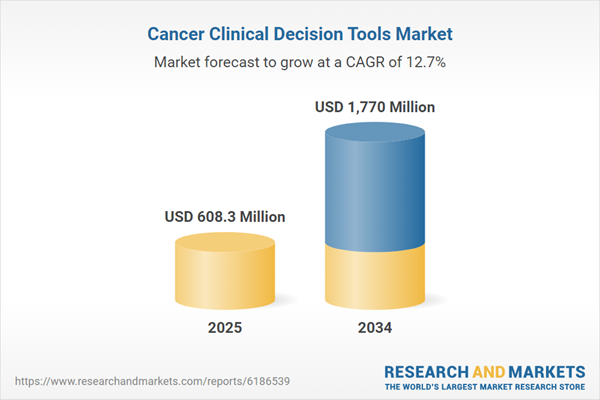The cancer clinical decision tools market has been growing steadily as healthcare providers increasingly rely on advanced technologies to improve the accuracy and efficiency of cancer diagnosis and treatment planning. These tools leverage artificial intelligence (AI), machine learning, and big data analytics to offer evidence-based insights that guide clinicians in making more informed decisions. From diagnostic algorithms to treatment recommendation systems, cancer clinical decision tools play a critical role in personalizing care and optimizing patient outcomes.
A major factor driving the adoption of these tools is the sheer volume and complexity of medical data in oncology. Modern cancer care involves analyzing genetic profiles, imaging results, pathology reports, and clinical guidelines, which can be overwhelming for individual practitioners. Clinical decision support (CDS) platforms help integrate and interpret these data points, ensuring that clinicians have access to the latest research and treatment protocols. Moreover, these tools help identify potential drug interactions, highlight less invasive treatment options, and monitor patient progress, ultimately reducing errors and improving the quality of care.
However, the market also faces challenges such as interoperability issues, high implementation costs, and concerns over data privacy. Ensuring that decision support tools are seamlessly integrated with existing electronic health record (EHR) systems is critical for their success. Additionally, ongoing education and training for healthcare professionals are necessary to fully realize the benefits of these technologies. Despite these obstacles, the cancer clinical decision tools market is poised for growth as providers continue to adopt advanced solutions that enhance precision medicine and streamline clinical workflows.
Key Insights: Cancer Clinical Decision Tools Market
SeveralKey drivers behind the market’s growth include:
- The need to manage and interpret complex data from multiple sources, including genomics, imaging, and pathology.
- Increasing emphasis on personalized medicine, which requires advanced decision-support tools.
- Rising healthcare costs driving demand for more efficient and cost-effective treatment planning.
- The expansion of cancer treatment options, requiring tools to help clinicians navigate a growing array of therapies.
- Ongoing advancements in machine learning and natural language processing, making these tools more accurate and reliable.
- Integration difficulties with existing electronic health record (EHR) systems.
- High costs associated with developing, implementing, and maintaining these platforms.
- Data privacy and security concerns, especially when dealing with sensitive patient information.
- Reluctance among some clinicians to adopt new technologies due to workflow disruption or lack of training.
Cancer Clinical Decision Tools Market Segmentation
By Type
- Risk Assessment Tool (RAT)
- Qcancer
By End-User
- Hospital
- Clinics
Key Companies Analysed
- McKesson Corporation
- Medical Information Technology Inc.
- Philips Healthcare
- Siemens Healthineers AG
- Elsevier B.V.
- Macmillan Publishers Limited
- National Decision Support Company
- IBM Watson Health
- Cerner Corporation
- GE Healthcare
- Allscripts Healthcare Solutions Inc.
- Epic Systems Corporation
- Koninklijke Philips N.V.
- RaySearch Laboratories AB
- Elekta AB
- Varian Medical Systems Inc.
- Accuray Incorporated
- F. Hoffmann-La Roche Ltd.
- Flatiron Health Inc.
- Tempus Labs Inc.
- NantHealth Inc.
- Syapse Inc.
- Inspirata Inc.
- Oncora Medical Inc.
- Prognos Health Inc.
- Deep 6 AI Inc.
- PathAI Inc.
- Enlitic Inc.
- Ibex Medical Analytics Ltd.
- Zebra Medical Vision Ltd.
- Aidoc Medical Ltd.
Cancer Clinical Decision Tools Market Analytics
The report employs rigorous tools, including Porter’s Five Forces, value chain mapping, and scenario-based modeling, to assess supply-demand dynamics. Cross-sector influences from parent, derived, and substitute markets are evaluated to identify risks and opportunities. Trade and pricing analytics provide an up-to-date view of international flows, including leading exporters, importers, and regional price trends.Macroeconomic indicators, policy frameworks such as carbon pricing and energy security strategies, and evolving consumer behavior are considered in forecasting scenarios. Recent deal flows, partnerships, and technology innovations are incorporated to assess their impact on future market performance.
Cancer Clinical Decision Tools Market Competitive Intelligence
The competitive landscape is mapped through proprietary frameworks, profiling leading companies with details on business models, product portfolios, financial performance, and strategic initiatives. Key developments such as mergers & acquisitions, technology collaborations, investment inflows, and regional expansions are analyzed for their competitive impact. The report also identifies emerging players and innovative startups contributing to market disruption.Regional insights highlight the most promising investment destinations, regulatory landscapes, and evolving partnerships across energy and industrial corridors.
Countries Covered
- North America - Cancer Clinical Decision Tools market data and outlook to 2034
- United States
- Canada
- Mexico
- Europe - Cancer Clinical Decision Tools market data and outlook to 2034
- Germany
- United Kingdom
- France
- Italy
- Spain
- BeNeLux
- Russia
- Sweden
- Asia-Pacific - Cancer Clinical Decision Tools market data and outlook to 2034
- China
- Japan
- India
- South Korea
- Australia
- Indonesia
- Malaysia
- Vietnam
- Middle East and Africa - Cancer Clinical Decision Tools market data and outlook to 2034
- Saudi Arabia
- South Africa
- Iran
- UAE
- Egypt
- South and Central America - Cancer Clinical Decision Tools market data and outlook to 2034
- Brazil
- Argentina
- Chile
- Peru
Research Methodology
This study combines primary inputs from industry experts across the Cancer Clinical Decision Tools value chain with secondary data from associations, government publications, trade databases, and company disclosures. Proprietary modeling techniques, including data triangulation, statistical correlation, and scenario planning, are applied to deliver reliable market sizing and forecasting.Key Questions Addressed
- What is the current and forecast market size of the Cancer Clinical Decision Tools industry at global, regional, and country levels?
- Which types, applications, and technologies present the highest growth potential?
- How are supply chains adapting to geopolitical and economic shocks?
- What role do policy frameworks, trade flows, and sustainability targets play in shaping demand?
- Who are the leading players, and how are their strategies evolving in the face of global uncertainty?
- Which regional “hotspots” and customer segments will outpace the market, and what go-to-market and partnership models best support entry and expansion?
- Where are the most investable opportunities - across technology roadmaps, sustainability-linked innovation, and M&A - and what is the best segment to invest over the next 3-5 years?
Your Key Takeaways from the Cancer Clinical Decision Tools Market Report
- Global Cancer Clinical Decision Tools market size and growth projections (CAGR), 2024-2034
- Impact of Russia-Ukraine, Israel-Palestine, and Hamas conflicts on Cancer Clinical Decision Tools trade, costs, and supply chains
- Cancer Clinical Decision Tools market size, share, and outlook across 5 regions and 27 countries, 2023-2034
- Cancer Clinical Decision Tools market size, CAGR, and market share of key products, applications, and end-user verticals, 2023-2034
- Short- and long-term Cancer Clinical Decision Tools market trends, drivers, restraints, and opportunities
- Porter’s Five Forces analysis, technological developments, and Cancer Clinical Decision Tools supply chain analysis
- Cancer Clinical Decision Tools trade analysis, Cancer Clinical Decision Tools market price analysis, and Cancer Clinical Decision Tools supply/demand dynamics
- Profiles of 5 leading companies - overview, key strategies, financials, and products
- Latest Cancer Clinical Decision Tools market news and developments
Additional Support
With the purchase of this report, you will receive:- An updated PDF report and an MS Excel data workbook containing all market tables and figures for easy analysis.
- 7-day post-sale analyst support for clarifications and in-scope supplementary data, ensuring the deliverable aligns precisely with your requirements.
- Complimentary report update to incorporate the latest available data and the impact of recent market developments.
This product will be delivered within 1-3 business days.
Table of Contents
Companies Mentioned
- McKesson Corporation
- Medical Information Technology Inc.
- Philips Healthcare
- Siemens Healthineers AG
- Elsevier B.V.
- Macmillan Publishers Limited
- National Decision Support Company
- IBM Watson Health
- Cerner Corporation
- GE Healthcare
- Allscripts Healthcare Solutions Inc.
- Epic Systems Corporation
- Koninklijke Philips N.V.
- RaySearch Laboratories AB
- Elekta AB
- Varian Medical Systems Inc.
- Accuray Incorporated
- F. Hoffmann-La Roche Ltd.
- Flatiron Health Inc.
- Tempus Labs Inc.
- NantHealth Inc.
- Syapse Inc.
- Inspirata Inc.
- Oncora Medical Inc.
- Prognos Health Inc.
- Deep 6 AI Inc.
- PathAI Inc.
- Enlitic Inc.
- Ibex Medical Analytics Ltd.
- Zebra Medical Vision Ltd.
- Aidoc Medical Ltd.
Table Information
| Report Attribute | Details |
|---|---|
| No. of Pages | 160 |
| Published | October 2025 |
| Forecast Period | 2025 - 2034 |
| Estimated Market Value ( USD | $ 608.3 Million |
| Forecasted Market Value ( USD | $ 1770 Million |
| Compound Annual Growth Rate | 12.6% |
| Regions Covered | Global |
| No. of Companies Mentioned | 31 |









